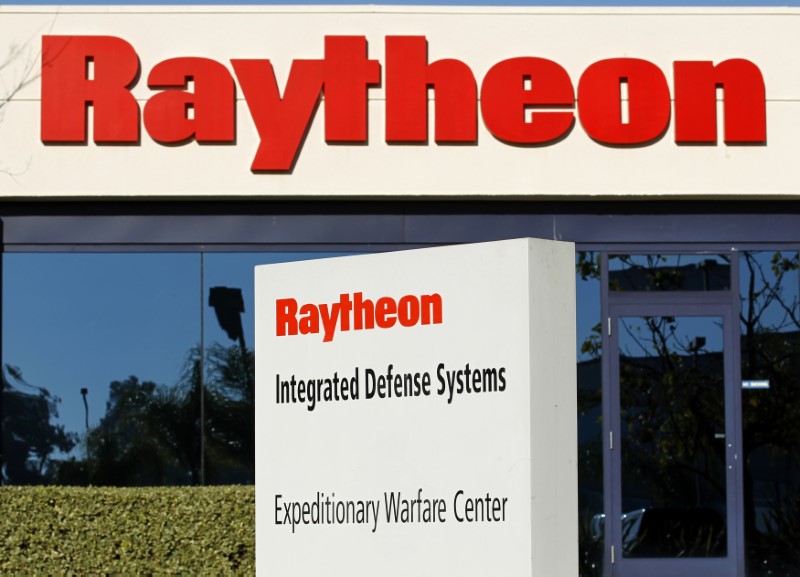By Mike Stone and Patricia Zengerle
WASHINGTON (Reuters) - U.S. defense contractors, which saw international sales rise strongly under President Barack Obama's administration, can expect a continued boom in arms exports under Donald Trump, aided by persistent security risks in the Middle East and rising tensions in Asia and Europe.
Shares of major defense contractors, including Raytheon Co . (N:RTN), Northrop Grumman Corp (N:NOC) and General Dynamics (N:GD) hit lifetime highs, on Wednesday as investors bet on higher Pentagon spending under Trump, who has vowed a massive build-up of the U.S. military even as he pledges to reduce foreign entanglements.
While Trump has frequently made contradictory statements when it comes to foreign policy, he has repeatedly called on allies in Europe and East Asia to pay more for their own defense. Defense experts say that could benefit the domestic industry as Trump is expected to keep supporting the supply of U.S. arms exports to allies to help them build up their own defense capabilities.
"From the U.S. side it would be us equipping them to do that," said Roman Schweizer an analyst at Cowan & Co.
That would also fit with Trump's plan to stimulate the domestic economy by boosting U.S. manufacturing jobs.
A Trump administration will have "more openness to selling weapons to our allies and partners. It’s business friendly, it plays to the U.S. manufacturing base," said Mark Cancian, senior adviser at the Center for Strategic and International Studies.
U.S. arms exports, measured by production costs, grew 54 percent in 2015 from 2008, the year before President Barack Obama took office, according to the Stockholm International Peace Research Institute. That represents the highest growth for any administration since the Truman and Eisenhower presidencies following World War Two.
The boom was fueled by consistent lobbying by the Obama administration for arms deals, its policy of arming and training proxy groups in conflicts, and by budget constraints at home that prompted arms makers to look abroad for sales.
In 2015, the U.S. accounted for 36 percent of worlds arms exports, the Stockholm Institute's data shows, followed by Russia at 12 percent. That marked an increase in the U.S. share from 28 percent in 2008.
In fiscal 2015, U.S. arms sales to foreign governments exceeded $47 billion, up 36 percent from around $34 billion a year earlier, according to the Department of Defense. Saudi Arabia, Australia, Iraq, Korea and Taiwan -- all considered U.S. allies -- were the top five recipients of U.S. weapons in the year ended September 2015.
GLOBAL CONFLICTS
Trump has never spelled out how he would deploy additional manpower for the U.S. military, such as 60,000 more Army troops, as many as 10,000 more Marines, and dozens of new Navy ships and fighter jets.
Independent cost estimates for his plan range from $150 billion to $900 billion in additional spending over 10 years, which could be achieved only by raising the federal budget deficit, raising taxes or making large cuts in spending programs such as healthcare benefits for older Americans.
None of these is politically popular, and raising the deficit would face fierce resistance from the deficit-fighting Freedom Caucus wing of the Republican Party.
Trump's lack of national security credentials and scarce detail about his possible advisors also make it difficult to assess his impact on foreign policy.
Nevertheless, analysts say his call for a stronger U.S. military against the backdrop of rising global conflicts, bodes well for strong revenues.
“I think that foreign military sales would absolutely go up, or at the very least stay at its current level,” said Franklin Turner, co-leader of law firm McCarter English’s government contracts & export controls practice.
"I can't imagine that the world becomes a less violent place."
Raytheon Co, the maker of Tomahawk missiles, said its international business will continue to grow regardless of the change of administration. During the 2008-2015 period, its international sales grew 55 percent to $7.15 billion.
"Raytheon has been in business for over 90 years, over the time we have obviously worked with presidents from both parties," Chief Financial Officer Toby O’Brien told Reuters in an interview.
Lockheed Martin Corp (N:LMT), the Pentagon's No.1 contractor known for its Hellfire missiles and F-35 fighter jets, increased international sales by 74 percent during Obama's presidency to $9.5 billion in 2015.
Boeing Co's (N:BA) international defense sales rose 28 percent in the last five years to $9.4 billion in 2015, while Northrop Grumman Corp's (N:NOC) foreign sales grew 60 percent over the same period to $3.3 billion.
There are two major ways foreign governments purchase arms from U.S. companies. Direct commercial sales, negotiated between a government and a company; and foreign military sales, where a foreign government typically contacts a Department of Defense official at the U.S. embassy in their capital. Both require approval by the U.S. government.
Some major sales have been held up by members of Congress, who fear U.S. arms could be used to fuel foreign conflicts, quell popular unrest or facilitate human rights violations.
Congress has oversight over major weapons sales, including those that are completely or partly financed by the U.S. government, and it is highly unusual for sales to go ahead if there are strong objections from lawmakers.
“Congress has never been a rubber stamp on arms transfers. We exercise close oversight and will continue to do so under the next president,” said Representative Eliot Engel, the ranking Democrat on the House Foreign Affairs Committee.
Daryl Kimball, executive director of the Arms Control Association in Washington, said the government and companies often are not "paying sufficient attention to the long-term impact of weaponizing key regions" while trying to sell to "win friends and allies."

"When several warring states in a region are being amply supplied with new weapons, they are more tempted to use those weapons," Kimball said.